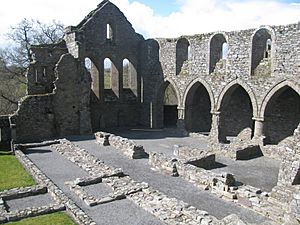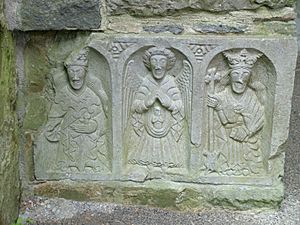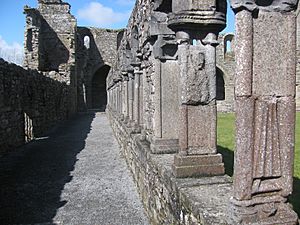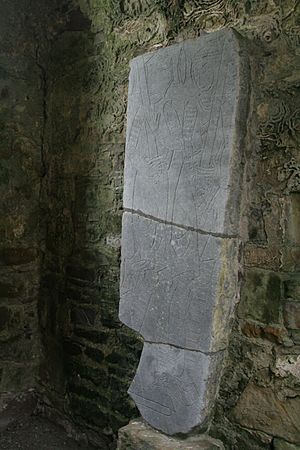Jerpoint Abbey facts for kids
| Mainistir Sheireapúin | |
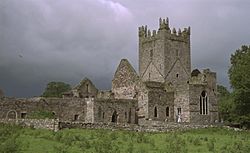
East front of Jerpoint Abbey
|
|
| Monastery information | |
|---|---|
| Order | Cistercians |
| Established | 1180 |
| Disestablished | 1541 |
| Diocese | Ossory |
| People | |
| Founder(s) | Donchadh Ó Donnchadha Mac Giolla Phátraic, King of Osraige |
| Architecture | |
| Status | Inactive |
| Style | Cistercian |
| Site | |
| Location | Thomastown, County Kilkenny, Ireland |
| Coordinates | 52°30′39″N 7°09′29″W / 52.51093°N 07.15798°W |
| Public access | No |
| Official name | Jerpoint Abbey |
| Reference no. | 80 |
Jerpoint Abbey (Irish: Mainistir Sheireapúin) is an old, ruined abbey in County Kilkenny, Ireland. It was built by Cistercians, a group of monks, in the late 1100s. You can find it about 2.5 kilometers southwest of Thomastown.
Today, Jerpoint Abbey is a national monument. This means it's a very important historical site. The Irish government's Office of Public Works has been taking care of it since 1880. There's even a visitor center where you can learn more about its history.
Experts believe that Domnall Mac Gilla Pátraic, a king from the 1100s, might have started the abbey. It officially became a Cistercian abbey in 1180. The abbey was dedicated to the Blessed Virgin Mary. It is famous for its amazing stone carvings, including one on the tomb of Bishop Felix Ua Duib Sláin. Jerpoint Abbey was a busy and important place until King Henry VIII of England took control of many monasteries in the 1500s.
Contents
Discovering Jerpoint Abbey's Past
How the Abbey Began
In 1180, Donogh O'Donoghoe Mac Gilla Patraic, the King of Ossory, moved the Cistercian monks to this spot. He built the abbey here, possibly on the site of an even older monastery. Some historians think that an earlier Benedictine monastery was built here around 1160. This was by Domnall Mac Gilla Patraic, another King of Osraige.
Changes Over Time
Jerpoint Abbey continued to be an important center for many years. However, its time as a working monastery ended in the 1500s. This happened during a period when King Henry VIII of England decided to take control of many monasteries. The last abbot, Oliver Grace, gave the abbey to the king.
In 1541, the abbey was given to James Butler, the 9th Earl of Ormond. Over time, the abbey became a popular burial place for important families in the area. For example, Bishop Felix Ua Duib Sláin was buried here in 1202.
Protecting the Abbey Today
Since 1880, Jerpoint Abbey has been looked after by the Office of Public Works. It is protected as a national monument. This ensures that this important historical site is preserved for everyone to visit and learn from.
Exploring the Abbey's Design
Unique Stone Carvings
The ruins of Jerpoint Abbey are quite large and show different styles of building. You can see older Norman styles mixed with early English architecture. The abbey is especially famous for its detailed stone carvings. These carvings can be found throughout the site, including on the tomb of Bishop Felix Ua Duib Sláin.
Key Features of the Abbey
The abbey has a tall, square tower with battlements. The main church part, with its Romanesque details, dates back to the 12th century. In the chapels, you can find tomb sculptures from the 13th to 16th centuries. The tower and the cloister, which is a covered walkway, were built in the 15th century. The cloister arcade has very special and unique carvings that are worth seeing.
Local Legends and Stories
The Grave of Saint Nicholas
Close to Jerpoint Abbey, in a place called Newtown Jerpoint, there are the ruins of an old church. A local legend says that the grave of Saint Nicholas is located there. Saint Nicholas is the saint who inspired the story of Santa Claus!
See also
 In Spanish: Abadía de Jerpoint para niños
In Spanish: Abadía de Jerpoint para niños
 | Precious Adams |
 | Lauren Anderson |
 | Janet Collins |



